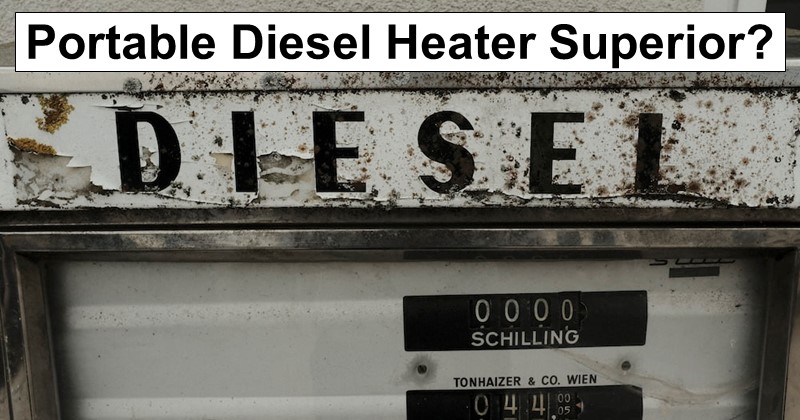I watched this video last week and got to wondering if I should jump ship from my trusty Mr. Heater Buddy propane heater and try a portable diesel heater, instead. I’ll skip to about three minutes in where he starts talking about diesel heaters in the video below to save you time. That said, the first three minutes are a good discussion for understanding why trying to run a normal 120-volt, 1500-watt space heater off-grid via a solar generator is a horribly inefficient idea if you want to jump back to the start and watch that part:
He makes some interesting points about efficiency of diesel fuel, especially when compared to propane. He also mentions that, according to him, propane results in a “wet” heat or something like that if used for more than a day, so much so that you’re better off not using propane for heat, at least, that’s what I gathered. I haven’t experienced that problem, so I’m not sure what to say about it.
What I didn’t hear him say was that, although diesel can last longer than gasoline when properly treated, propane fuel lasts indefinitely, and can be used for a variety of survival purposes around the house, including cooking. I’m generally a fan of propane.
Perhaps the only major drawback to using a portable diesel heater is that it needs some sort of battery power to work, whereas propane does not. The diesel heaters I looked at online don’t appear to need a lot of power, from what I gathered, which means they can be run via solar generator, but if I’m trying to remain efficient and save money, it’s hard to justify purchasing a solar generator for a portable heater alone. But if you already have one, then all the better.
But then I watched the following video on three ways to heat your home, including propane (using the Mr. Heater we preppers know and love) and canned fuel via the Vesta heater and cooker, another interesting idea that I’ll probably buy at some point. That said, if you skip to the 10:00 mark (I’ll do it for you in the video linked below) then you can watch the part about using a portable diesel heater; seems he’s quite impressed with the heat output. But what I want to point out, specifically, is that the guy simply connected the DC wires from the portable diesel heater using jumper cables to his vehicle battery, which seemed to work just fine:
CAUTION: I should point out that doing something like this (using jumper cables to power the diesel heater) is only a very temporary solution and certainly not the best option because you surely wouldn’t want those metal clamps to ever touch! Personally, if I were to use jumper cable, then I would want to do something proactive to keep them from touching or disengaging.
In any case, a portable diesel heater is an intriguing solution to a problem that many of us, me included, could easily have: needing an efficient source of whole-house heat for days on end if the power goes out. Sure, I plan on using firewood in my wood stove as my first choice, but I do like having options. And because my wood stove is in the basement, I could foresee ways to use a diesel heater upstairs, in my garage, and perhaps elsewhere…it is portable, after all. And not terribly expensive, either.
As for which diesel heater to get, I don’t have a clue. Most of the relatively inexpensive ones (less than about $150) all look the same to me. Aside from different brands stamped on the side, my guess is that they’re all made in the same Chinese factory. There are other, more expensive options, but they don’t look any better from what I can gather. I say just go for the best priced red one, lol.
Again, I haven’t purchased one yet–I’m sitting on my hands about the decision for now–but it’s on my never-ending list of more crap to buy that only seems to be taking up space in my garage which, whenever I pass on, my family is going to wonder what in the world I’ve been doing my whole live, but then they’ll finally understand why I could never retire. 🙂
One last note: If you do buy one of these heaters, set it up so that the unit stays outside and you vent the heat indoors, as shown in the second video above. Not only would a unit like this produce carbon monoxide (probably in copious amounts) and who knows what else from the exhaust, but it could malfunction and cause a catastrophe that might burn your house down. Yes, a fire could be highly problematic outdoors, too, but at least you’ll have a fighting chance to get it under control outdoors than you would indoors. In fact, I would go to greater lengths to ensure all brush, grass, and anything else that’s flammable around such a heater is cleared away…better safe than sorry and all that.
And if you have one of these already, or you buy one after reading this, I’d love to hear your thoughts!

Leave a Reply